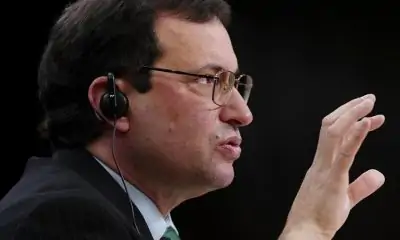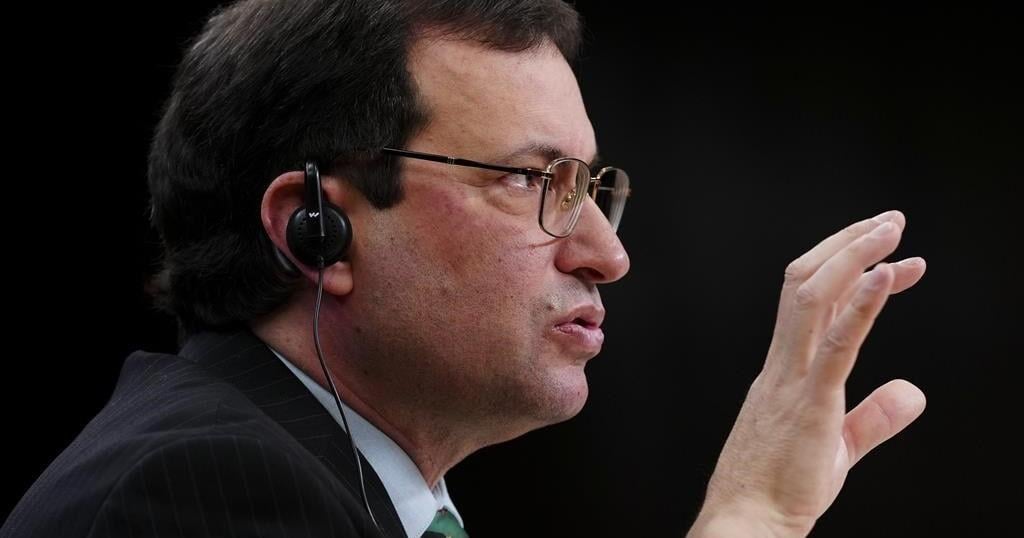OTTAWA – Canada is still not on track to meet its commitments under the Paris climate agreement, federal Environment Commissioner Jerry DeMarco said in a new report on Thursday.
Ottawa has promised to reduce greenhouse gas emissions to be 40 to 45 per cent below 2005 levels by 2030, but so far they have only fallen seven per cent below 2005 levels.
In a news conference after the reports were tabled in Parliament, DeMarco said it is still possible to meet those targets but the “task is much harder because there’s only six years left to do essentially 20 or 30 years’ worth of reductions.”
“It’s not time to give up,” he said.
While progress is “painfully slow” on some of the government’s policies, DeMarco said, “that’s not a reason to just throw up our hands and say we won’t make it.”
“We owe it to our children and our grandchildren to make as great an effort as possible to meet these global challenges.”
The report looked at 20 of the 149 measures from the government’s 2030 Emission Reductions Plan progress report, and found they were being implemented too slowly to fulfil their intended goal.
Only nine of those were on track and another nine were facing challenges.
The other two had significant barriers like delays in meeting milestones, including the initiative to get Indigenous communities off diesel fuel, and the oil and gas emissions cap. The government only published the cap’s draft regulations on Monday, after promising the measure in the 2021 election.
“Overall, the federal government had advanced a variety of mitigation measures to support progress towards a net-zero transition but had still not made sufficient progress to reduce greenhouse gas emissions to meet its 2030 target,” the report reads.
The report also zeroed in on whether Environment and Climate Change Canada has reported on its progress with enough transparency. In 2021, Parliament passed a law requiring the department to set emission targets and to publish emissions reduction plans and progress reports.
That law requires the department to include in its progress report what additional measures could be taken if Canada is not on track to meet its 2030 targets. As such, DeMarco said he expected more measures to be included in last year’s progress report since Canada clearly knew it wasn’t doing enough to meet the target.
Of the 32 additional measures the department published — in addition to the 149 existing ones — DeMarco found only seven were new measures. Three of them enhanced existing measures, and the other 22 were ones the department had already reported.
That included continuing to develop the Canada Green Buildings Strategy, which was already in the original plan.
DeMarco found the government has made strides in consulting with the provinces, territories and Indigenous Peoples, and that the department met its legislative reporting requirements. However he was critical of the government’s transparency with regards to its modelling data — concerns which he also raised in his report last year.
“Although the department made marginal transparency improvements on modelling assumptions for federal measures in the emissions projection report, it still provided insufficient details,” DeMarco’s latest report read, noting the department only provided details for one-third of the measures it included in its modelling.
“This issue of the lack of transparency in the modelling continues to be an ongoing concern, which can undermine the trust and credibility in the reported progress,” the report read.
Speaking to reporters outside the House of Commons on Thursday, Environment Minister Steven Guilbeault said the government could do better on transparency, and reiterated the work already done to bring emissions down.
“I agree with (DeMarco). We need to continue moving forward to implement measures to reach our 2030 target,” Guilbeault said.
“I should point out it’s the first time in Canada’s history emissions are going down because of measures that the government is taking.”
Guilbeault said final regulations for clean electricity standards will be released in the coming weeks.
This report by The Canadian Press was first published Nov. 7, 2024.


































